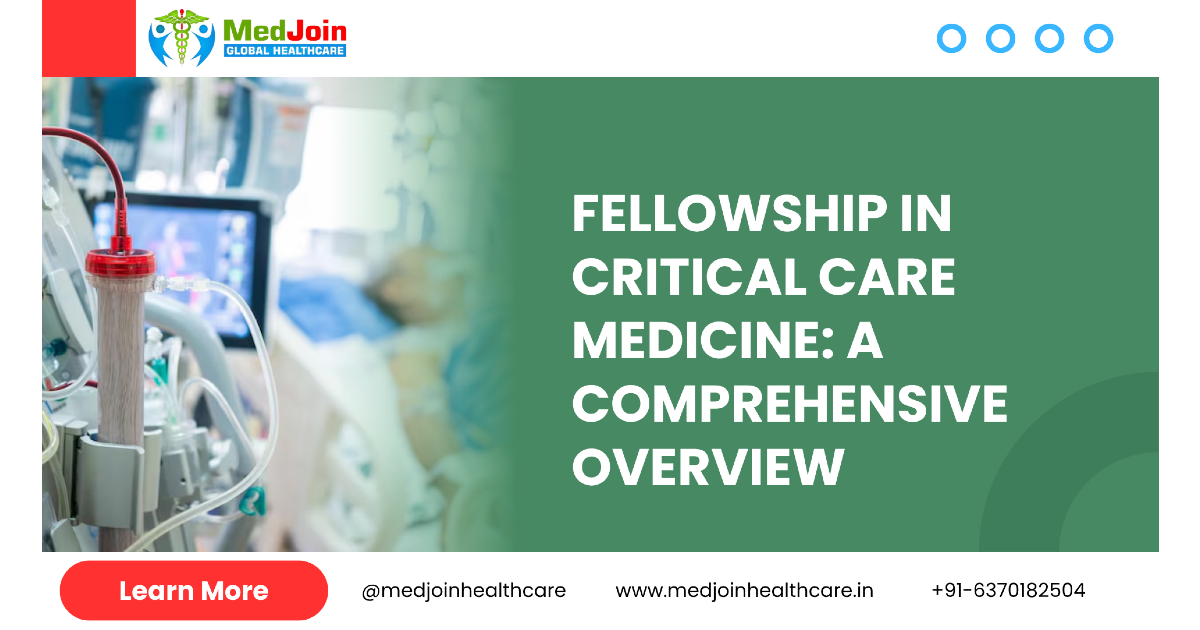
The Fellowship in Critical Care Medicine (FCCM) is an advanced, specialized training program designed for physicians who aspire to excel in the management of critically ill patients. This fellowship offers an in-depth understanding of intensive care principles, clinical skills, and multidisciplinary approaches essential for providing life-saving care in intensive care units (ICUs).
Critical care medicine is a vital branch of medical science that integrates knowledge from internal medicine, anesthesiology, pulmonology, cardiology, neurology, and surgery to manage patients with life-threatening conditions. Through this fellowship, medical professionals acquire both the theoretical knowledge and hands-on clinical experience necessary to handle complex cases, use advanced technologies, and make critical decisions in emergency scenarios.
What is Critical Care Medicine?
Critical Care Medicine, often referred to as Intensive Care Medicine, is the discipline that focuses on diagnosing and treating patients with severe, life-threatening illnesses or injuries. These conditions often involve multiple organ failures, severe infections (like sepsis), acute respiratory distress, cardiac emergencies, and trauma-related complications.
Specialists in this field—Intensivists—are responsible for managing ventilators, hemodynamic monitoring, resuscitation, and advanced organ support systems. They work in collaboration with nurses, respiratory therapists, pharmacists, and surgeons to provide continuous and comprehensive care to critically ill patients.
Importance of Fellowship in Critical Care Medicine
In the modern era, the complexity of diseases and the increasing prevalence of life-threatening medical conditions have amplified the need for skilled critical care physicians. The COVID-19 pandemic has further highlighted the indispensable role of critical care experts in managing acute respiratory and multi-organ failure cases.
A Fellowship in Critical Care Medicine provides physicians with:
- Specialized expertise in ICU patient management.
- Proficiency in life-support technologies such as ventilators, dialysis, and ECMO.
- Competence in emergency decision-making and resuscitation protocols.
- Enhanced leadership and teamwork skills for ICU operations.
- Research and academic exposure in the field of intensive care.
Thus, the fellowship acts as a gateway to an advanced career in hospitals, trauma centers, and academic institutions.
Program Overview
The Fellowship in Critical Care Medicine typically spans 1 to 2 years, depending on the institution and the participant’s prior qualifications (MD, DNB, or equivalent). The curriculum is designed to balance theoretical learning, clinical rotations, and research exposure, ensuring that fellows are well-equipped to handle diverse medical emergencies.
Eligibility Criteria
To enroll in the fellowship, candidates should generally possess:
- An MBBS degree with appropriate clinical experience, or
- A postgraduate qualification (MD/DNB) in Internal Medicine, Anesthesiology, Pulmonology, or Emergency Medicine.
Some programs may also consider candidates with relevant experience in ICU management or hospital-based emergency care.
Curriculum and Learning Modules
The curriculum for Fellowship in Critical Care Medicine is structured to cover all essential components of critical care through lectures, clinical training, and research work.
Core Modules Include:
1. Principles of Critical Care
- Overview of ICU setup and organization.
- Patient monitoring systems and documentation.
- Infection control, aseptic techniques, and ICU safety protocols.
2. Airway Management and Mechanical Ventilation
- Techniques of airway management and intubation.
- Non-invasive and invasive mechanical ventilation strategies.
- Ventilator weaning and troubleshooting.
3. Hemodynamic Monitoring and Support
- Arterial, central venous, and pulmonary artery catheterization.
- Fluid resuscitation and vasoactive drug administration.
- Management of shock and sepsis.
4. Neurological and Neurosurgical Critical Care
- Management of coma, traumatic brain injury, and stroke.
- Intracranial pressure monitoring and brain death evaluation.
5. Cardiac Critical Care
- Management of myocardial infarction, arrhythmias, and heart failure.
- Advanced cardiac life support (ACLS).
6. Respiratory Critical Care
- Acute respiratory distress syndrome (ARDS).
- Oxygen therapy, ECMO, and non-invasive ventilation.
7. Renal and Hepatic Support
- Acute kidney injury management and dialysis modalities.
- Liver failure management and transplant ICU care.
8. Trauma and Emergency Critical Care
- Management of polytrauma, burns, and acute bleeding.
- Resuscitation and emergency stabilization techniques.
9. Infection Control and Antibiotic Stewardship
- Sepsis management and antimicrobial protocols.
- Hospital-acquired infection prevention.
10. Ethics, Communication, and Palliative Care
- End-of-life decision-making and patient-family communication.
- Ethical dilemmas in critical care.
11. Research and Evidence-Based Medicine
- Clinical research methodology and data interpretation.
- Critical appraisal of literature and publication writing.
Clinical Training and Hands-on Experience
Fellows undergo rotations in various ICUs, including general, medical, surgical, cardiac, and neurological units. The training emphasizes:
- Daily ICU rounds and case discussions.
- Performing and interpreting diagnostic procedures (arterial lines, central lines, lumbar punctures, etc.).
- Managing ventilators and hemodynamic support systems.
- Exposure to organ transplantation and trauma care units.
- Participation in multidisciplinary meetings and morbidity-mortality conferences.
This hands-on exposure ensures the fellows gain confidence in managing high-stakes clinical situations and leading critical care teams effectively.
Research and Academic Component
The fellowship also emphasizes academic growth and evidence-based practice. Fellows are encouraged to:
- Undertake research projects related to ICU outcomes, ventilator strategies, or sepsis management.
- Present papers and case studies at national and international conferences.
- Publish research findings in peer-reviewed medical journals.
This fosters analytical thinking and contributes to the growing body of knowledge in critical care medicine.
Skills Acquired During the Fellowship
Upon completion, fellows are expected to demonstrate:
- Clinical Proficiency: Independent management of critically ill patients with multi-organ failure.
- Technical Skills: Invasive procedures, ventilator management, hemodynamic monitoring.
- Leadership: Coordination with multidisciplinary teams and supervision of ICU staff.
- Research Aptitude: Designing, conducting, and analyzing clinical studies.
- Communication Skills: Effective interaction with patients’ families and colleagues during emergencies.
Career Opportunities
Graduates of the Fellowship in Critical Care Medicine can pursue careers in:
- Hospitals and ICUs: As intensivists or critical care consultants.
- Academic Institutions: As faculty, researchers, and trainers.
- Emergency and Trauma Centers: Managing acute and complex medical cases.
- Tele-ICU and Remote Monitoring Systems: Providing virtual critical care consultation.
- Public Health and Disaster Medicine: Contributing to emergency response and epidemic management.
Critical care physicians are in high demand globally, and this fellowship opens doors to both national and international career prospects.
Why Choose Fellowship in Critical Care Medicine?
This fellowship is ideal for physicians who are passionate about saving lives, making critical decisions, and working under high-pressure environments. It builds the expertise needed to manage life-threatening conditions with precision and confidence.
Key Advantages:
- Advanced, structured training from critical care experts.
- Hands-on experience in modern ICUs with advanced technology.
- Continuous professional growth through academic learning.
- Global recognition and career advancement opportunities.
In addition, this fellowship cultivates compassion and resilience—essential qualities for healthcare professionals dealing with patients and families in distress.
Duration and Certification
The duration of the Online Fellowship in Critical Care Medicine varies between 12 months to 24 months, depending on the institution.
After successful completion of:
- Coursework,
- Clinical rotations, and
- Final assessments (theory, practical, and viva),
the candidate is awarded the “Fellowship in Critical Care Medicine” certificate, which is recognized by accredited medical education boards and universities.
The Fellowship in Critical Care Medicine is a transformative journey for physicians seeking mastery in the management of critically ill patients. It equips doctors with advanced clinical acumen, procedural expertise, and leadership qualities essential in intensive care settings.
In an era where complex medical emergencies are increasingly common, critical care specialists serve as the backbone of hospital-based medicine. This fellowship not only enhances professional competence but also reinforces the humanitarian spirit at the core of medical practice—saving lives, restoring hope, and leading with compassion in the face of crisis.
References
- Marino, P. L. (2014). The ICU Book (4th ed.). Lippincott Williams & Wilkins.
- Hall, J. B., Schmidt, G. A., & Kress, J. P. (2016). Principles of Critical Care (4th ed.). McGraw-Hill.
- Society of Critical Care Medicine (SCCM) – www.sccm.org
- Indian Society of Critical Care Medicine (ISCCM) – www.isccm.org
- Vincent, J. L. (2017). Textbook of Critical Care. Elsevier.






